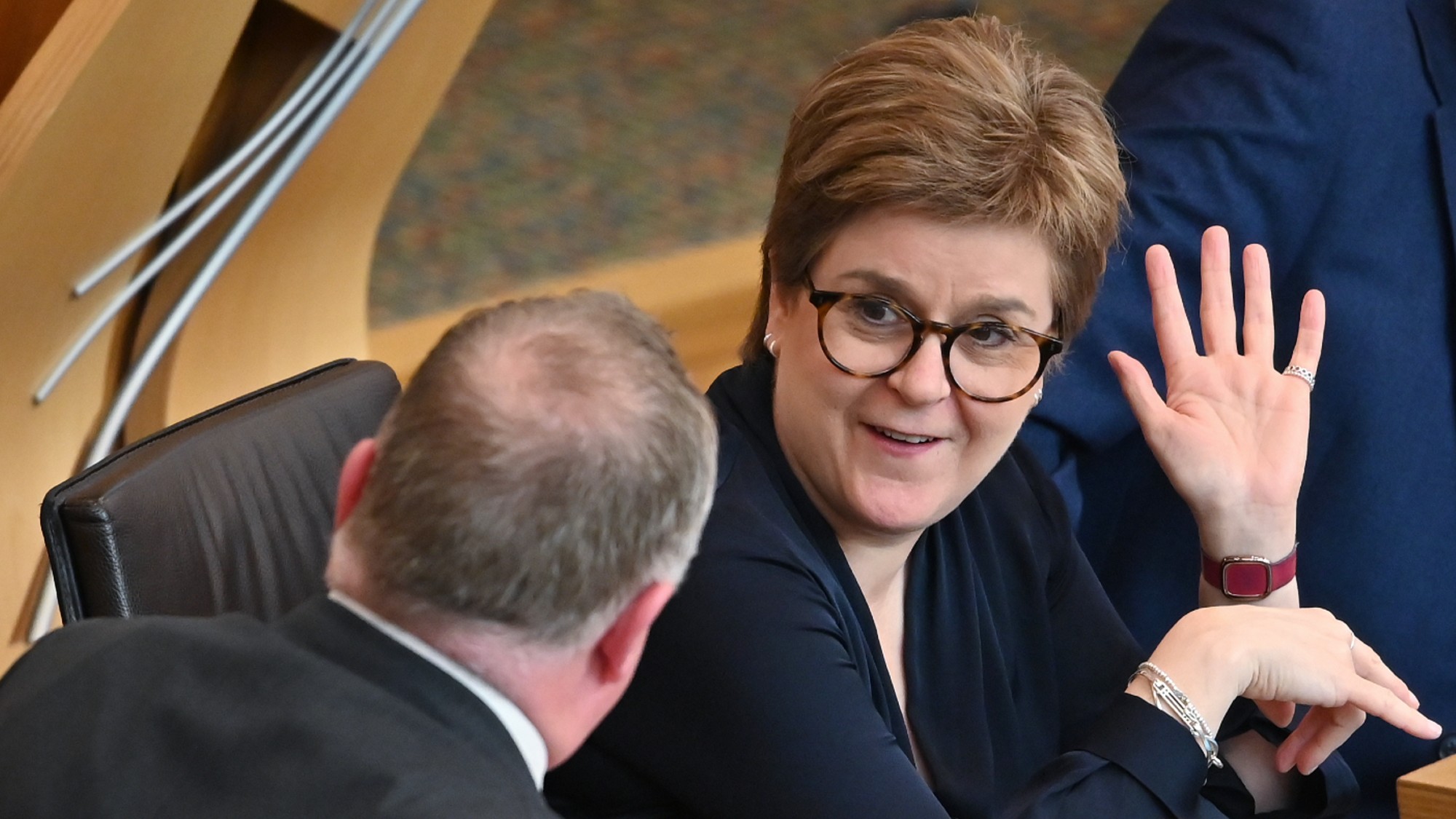What next for Scottish independence?
SNP leader Nicola Sturgeon says indyref2 is ‘democratic right’

A free daily email with the biggest news stories of the day – and the best features from TheWeek.com
You are now subscribed
Your newsletter sign-up was successful
Tory minister Michael Gove has struck a blow against the Scottish National Party by “absolutely” ruling out allowing a Scottish independence referendum.
SNP leader Nicola Sturgeon has already called for “indyref2” following her party’s general election success, and plans to present Prime Minister Boris Johnson with a “detailed democratic case for the transfer of power” to Scotland.
But in an interview with Sky News’ Sophy Ridge on Sunday, Gove insisted: “We had the referendum on whether or not Scotland should be separate from the United Kingdom in 2014, we were told that that referendum would settle the question for a generation. We are not going to have an independence referendum on Scotland.”
The Week
Escape your echo chamber. Get the facts behind the news, plus analysis from multiple perspectives.

Sign up for The Week's Free Newsletters
From our morning news briefing to a weekly Good News Newsletter, get the best of The Week delivered directly to your inbox.
From our morning news briefing to a weekly Good News Newsletter, get the best of The Week delivered directly to your inbox.
Scottish voters opted to remain in the UK by 55% to 45% in the referendum five years ago.
What has the SNP said?
Sturgeon says her party’s big general election win - which saw the SNP take 48 of Scotland’s 59 seats - is a mandate for a new independence referendum.
In a victory speech in Edinburgh on Friday, she insisted: “This isn’t about asking Boris Johnson or any other Westminster politician for permission. This is instead an assertion of the democratic right of the people of Scotland to determine our own future.”
A free daily email with the biggest news stories of the day – and the best features from TheWeek.com
Expanding on that argument on Sunday, Sturgeon said that “Scotland cannot be imprisoned in the union against its will” and that denying Scots another vote would be a “perversion and subversion of democracy”.
“The will of the Scottish people cannot be ignored, that is just the simple fact of the matter,” she told the BBC’s The Andrew Marr Show. “If the United Kingdom is to continue, it can only be by consent and if Boris Johnson is confident in the case for the union he should be confident enough to make that case and allow people to decide.”
A refusal by Johnson to allow the vote would not be “the end of the matter”, she added.
SNP MP Angus MacNeil has suggested a “plan B” in which all of his party’s MPs in Scotland to resign their seats, and contest them on the basis that they support independence.
“There would be 48 by-elections, and at 48 by-elections you would come back with a direct electoral mandate for independence,” MacNeil told the Glasgow-based Daily Record.
According to i news, the leader of Scottish Labour, Richard Leonard, is also considering backing a Scottish independence referendum, amid growing pressure for his party to changes its stance on the issue.
What has Westminster said?
Johnson was clear throughout the general election campaign that he would not approve a request for another Scottish independence referendum, and the PM is even less likely to back down after winning his huge landslide.
Responding to Sturgeon’s victory speech, a Downing Street spokesperson said Johnson had reiterated “his unwavering commitment to strengthening the union”.
“The prime minister made clear how he remained opposed to a second independence referendum, standing with the majority of people in Scotland who do not want to return to division and uncertainty. He added how the result of the 2014 referendum was decisive and should be respected,” the spokesperson continued.
Hammering home that message, Gove told Sky News’ Ridge that he could “absolutely" guarantee with “no ifs, no buts” that the Government would never grant a second independence referendum.
“In this general election we have just seen what happens when politicians try to overturn a referendum result, and in the same way we should respect the referendum result of 2014,” he said.
–––––––––––––––––––––––––––––––For a round-up of the most important stories from around the world - and a concise, refreshing and balanced take on the week’s news agenda - try The Week magazine. Start your trial subscription today –––––––––––––––––––––––––––––––
What will happen?
According to the Institute for Government think-tank, existing legislation is “widely interpreted to mean that any referendum relating to Scottish independence would require Westminster approval”.
“However, the matter has never been tested in court, so there remains some uncertainty about whether Holyrood could hold an advisory referendum without consent,” says the institute.
In March 2017, Sturgeon formally requested the consent of Westminster to hold another referendum, which then-PM Theresa May declined, arguing that “now is not the time”.
And despite the renewed push now by the SNP, without a transfer of power through a “section 30 order” approving a referendum, a second independence vote would almost certainly be blocked again in the UK’s courts.
As Spiked says, “mandate or not, the SNP has no obvious path to independence at the moment... everyone agrees that only the UK government can actually grant independence.”
-
 Quiz of The Week: 14 – 20 February
Quiz of The Week: 14 – 20 FebruaryQuiz Have you been paying attention to The Week’s news?
-
 The Week Unwrapped: Do the Freemasons have too much sway in the police force?
The Week Unwrapped: Do the Freemasons have too much sway in the police force?Podcast Plus, what does the growing popularity of prediction markets mean for the future? And why are UK film and TV workers struggling?
-
 Properties of the week: pretty thatched cottages
Properties of the week: pretty thatched cottagesThe Week Recommends Featuring homes in West Sussex, Dorset and Suffolk
-
 How corrupt is the UK?
How corrupt is the UK?The Explainer Decline in standards ‘risks becoming a defining feature of our political culture’ as Britain falls to lowest ever score on global index
-
 The high street: Britain’s next political battleground?
The high street: Britain’s next political battleground?In the Spotlight Mass closure of shops and influx of organised crime are fuelling voter anger, and offer an opening for Reform UK
-
 ‘It’s hard not to feel for the distillers’
‘It’s hard not to feel for the distillers’Instant Opinion Opinion, comment and editorials of the day
-
 Is a Reform-Tory pact becoming more likely?
Is a Reform-Tory pact becoming more likely?Today’s Big Question Nigel Farage’s party is ahead in the polls but still falls well short of a Commons majority, while Conservatives are still losing MPs to Reform
-
 Taking the low road: why the SNP is still standing strong
Taking the low road: why the SNP is still standing strongTalking Point Party is on track for a fifth consecutive victory in May’s Holyrood election, despite controversies and plummeting support
-
 Nicola Sturgeon's memoir: making the personal political
Nicola Sturgeon's memoir: making the personal politicalTalking Point Former Scottish first minister attempts to set record straight in 'Frankly' but does she leave more questions than answers?
-
 What difference will the 'historic' UK-Germany treaty make?
What difference will the 'historic' UK-Germany treaty make?Today's Big Question Europe's two biggest economies sign first treaty since WWII, underscoring 'triangle alliance' with France amid growing Russian threat and US distance
-
 Is the G7 still relevant?
Is the G7 still relevant?Talking Point Donald Trump's early departure cast a shadow over this week's meeting of the world's major democracies